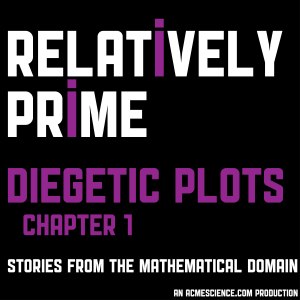On top of the usual disclosures, I should add that Dave Gale and I interviewed Samuel Hansen this week for our Wrong, But Useful podcast, which you might like to listen to for a deeper insight into Samuel’s brain.
During the conversation, he warned me I wouldn’t like Episode 4 of the new Relatively Prime, “Diegetic Plots, Chapter 1”. I don’t know if that was expectation management or an elaborate double bluff, but the joke’s on you, Hansen: I jolly well did like it, so there!
Now, I didn’t know what diegetic meant, even after it was explained to me. Luckily, Wikipedia has my back:
Diegesis /ˈdaɪəˈdʒiːsəs/ is a style of fiction storytelling that presents an interior view of a world in which:
1. details about the world itself and the experiences of its characters are revealed explicitly through narrative
2. the story is told or recounted, as opposed to shown or enacted.
Even after that, the geekiness of the joke still passes me by, but no matter! For a podcast subtitled “Stories from the Mathematical Domain”, it makes sense to explore the world of literature — or, more precisely, poetry and prose.
We start with a poem by Gizem Karaali entitled The Colors of Math. I’m no poetryologist and don’t have an intelligent comment to make about this, except that there’s not enough about anger in descriptions of maths. Frustration? Sure. Apathy? Whatever. But anger?
There’s plenty of anger in the second segment, my first “I need to hear this again and probably again” part of this season: a reading of Ted Chiang‘s Division by Zero, the story of a mathematician who disproves the consistency of arithmetic and her baffled husband, written in the style of a bogus proof.
Third up is a piece of Samuel’s own work, The Patent World Order, an enjoyable sidetrack into a dystopian future where any sufficiently hard maths is patented. (I can sense his smugness at the name of the legal firm, by the way. Sense it from here.)
We’ve then got two excerpts from Stuart Rojstaczer‘s The Mathematician’s Shiva and an interview with the author. The book tells the story of Rachela, the greatest mathematician of her generation; the interview tells the story of where the story comes from.
Lastly, JoAnne Growney reads her poem A Taste of Mathematics, about a mathematician contemplating the billionth digit of π and how maths relates to jalapeños. If there’s not enough anger in mathematical writing, there are certainly not enough jalapeños.
Taking on the (literal) literature of mathematics is a bit of a sidestep from Relatively Prime’s habitual domain, but I think it’s an intriguing one; while I’ve questioned some of Samuel’s editorial judgement elsewhere in this season, it’s only fair to give him a high five when I think he’s got it right. For me, Relatively Prime is at its best when it’s unpredictable; of all the adjectives I could think of to describe Samuel and his work, boring is a long way down the list.
More information
Listen to Relatively Prime: Diegetic Plots, Chapter 1 at relprime.com. While you’re there, catch up on Season 1.
Colin was given early access to Season 2 of Relatively Prime, in return for writing reviews of each episode. Furthermore, Samuel is Aperiodipal numero uno and most of us chipped some money into the Relatively Prime Kickstarter, too. Just so you know.
